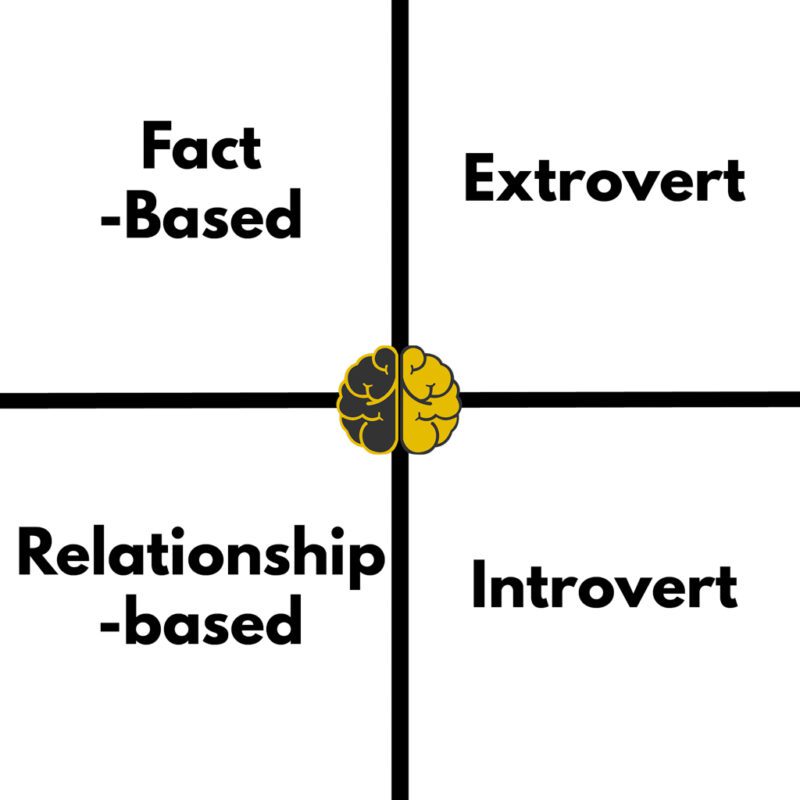According to gym owner and mentor Brian Bott, four personality types can be found in a gym.
To recap, the characteristics on the left combine with those on the right to create four groups:

Here’s how to approach coaching and programming for each.
The Fact-Based Introvert
These people are analytical. They’re going to want to review their InBody scan and all the data from their wearables each month.
Coaching these people means explaining exactly what’s going on in definitive terms. For example, “We’re going to increase your load by 5 percent. Your last deadlift day, we used 135 lb. for 10 reps. That means you should be able to do 155 for 8 today. That’s our goal.”
These people will want to get into the weeds. They’ll want to talk about tempo and heart-rate zones. Their confidence comes from knowing and feeling smart. They’ll probably always be looking at other programming online. Be ready to answer their questions about why your program is best for them, and don’t take offense when they ask why you’re not following CompTrain or Mayhem.
Over-explain their programming. In fact, over-explain everything. The more you come back to “why and how,” the better.
The Fact-Based Extrovert
These folks want to be the boss. They’re loud and in charge.
Let them choose their own adventure a bit. If you want them to do a pressing movement, you might let them choose between a barbell or dumbbells, for instance. This creates a bit more work for the coach, but this client will love having a choice.
During goal reviews, this client should be asked “what do you want to work on next?” And they’ll have an answer.
Let them feel as if they have some input on their training. If they want bigger arms, add a few curls once per week even if you don’t think they’re important. They need to feel important.
The hard part is when they assume they know what they’re doing and they don’t. Resist the urge to “win” the debate or prove that you’re smarter. Instead, keep them moving and steer them a little bit: “Hey, if you’re already this good, I have one little tweak that will make it even better.” Then just keep them around for a long time and keep tweaking their form.
If you get argumentative, they’re gone.
The Relationship-Based Introvert
Coach them directly and not in front of others. Private training is perfect for these people to start.
Grab the weights for them. Reduce opportunities for them to make mistakes, especially when they’re new.
These people can eventually work out in a group, but their biggest fear is appearing “different” or being singled out. They might want to “hide,” and that can lead to bad choices (choosing the same weight as everyone else).
Give them one-to-one feedback—even in a group—and encourage your other leaders to give them one-to-one feedback, too. Don’t single them out.
For programming, keep it simple. They won’t get bored. But don’t take risks: They’d be mortified if they fell on a box jump or tried and tried a pull-up and couldn’t get it. Early wins are more important for this group than for anyone else. They need to feel like “I can do this.”
These people will often stick with the same workout for a decade, even when it stops working, because they’re uncomfortable with change.
(If you highlight hand rips and a big group of people cheering on the last person to finish the workout, you will chase these people away. That’s the last thing they want.)
The Relationship-Based Extrovert
These people couldn’t care less about your programming. They want to be energized.
Ask how they’re feeling and tell them when you’re going to push it. They don’t need to know precise reps or weights. “We’re going to do 15 to 20!” They might want to know how many reps the others did, and they’re going to say things like, “Oh, that burns!”
They don’t want a lot of explanation. They don’t care about the numbers—but you need to keep track of their weights for them. They might lose track of their reps in a workout or talk while the coach is talking. They feed off your energy.
In goal reviews, make sure you ask “was this fun for you?” They care about their results, but they care more about the experience. They might need more conditioning workouts and intensity than the average person to stay engaged.
If you’re not this type of person yourself, this personality type might be tough to manage. But you need to provide them with energy and fun or they’ll leave to find it elsewhere.
Running a big group can take a lot of the “energy” burden off the coach, but relationship-based extroverts often need to be propped up until the party gets started.
Years ago, many of the people in my 6-a.m. class fell into this category. They exhausted me. But when I put a fresh, young coach in front of them, they absolutely loved her. She didn’t have my education or experience, but she could run a fun warmup and didn’t get frustrated by answering the same question over and over. The group grew better with her in charge of it.
The Easiest Type to Coach Is …
Which personality type is easiest to coach? Probably the person who’s most like you.
But be careful: If you only attract relationship-based extroverts, your churn rate will probably be high. And if you only attract fact-based introverts, your lead gen will be very slow.
A good mix is preferable. But keeping everyone engaged and working optimally requires you to develop your skill set as a coach so you can help every kind of person find success.
Other Media in This Series
“Sales Secrets: The Four Personalities in Your Gym”
“How to Be a CEO: Leading the Four Personalities on Your Team”

